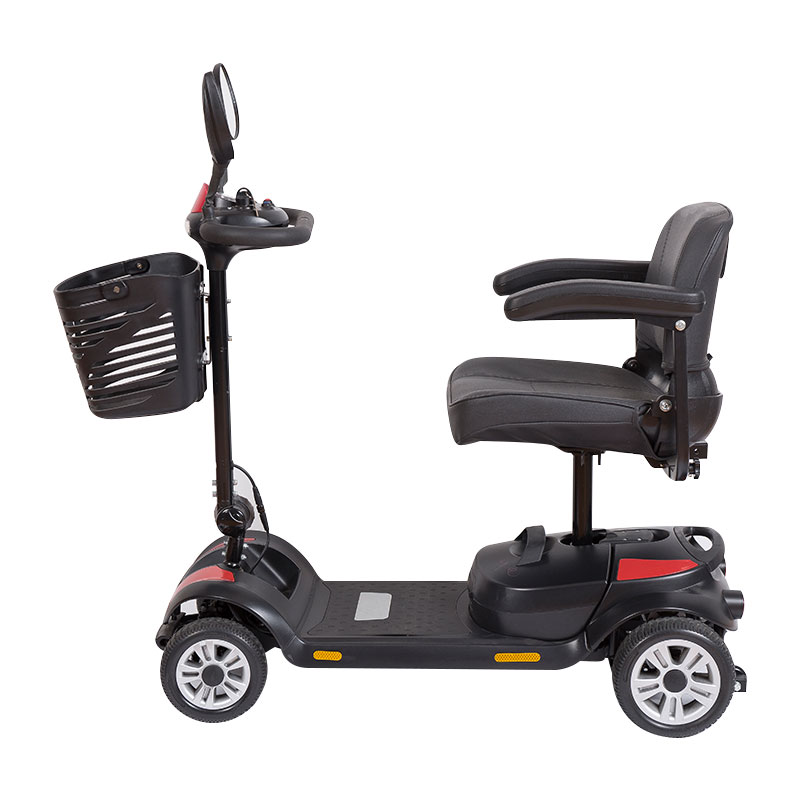How do electric wheelchairs help improve mobility and independence for elderly individuals with limited physical ability?
Electric wheelchairs play a significant role in improving mobility and independence for elderly individuals with limited physical abilities. Here's how they provide these benefits:
1. Enhanced Mobility
Power-Assisted Movement: Electric wheelchairs are powered by motors, allowing elderly users to move without needing to manually propel themselves. This is especially beneficial for individuals who may have weak muscles or joint problems, such as arthritis, that make using a traditional manual wheelchair difficult.
Indoor and Outdoor Use: Many electric wheelchairs are designed to navigate both indoor and outdoor environments, giving elderly users the freedom to move within their homes, in public spaces, and on varied terrains like sidewalks, ramps, and even grass.
Maneuverability in Tight Spaces: Advanced electric wheelchairs are highly maneuverable, with features like a tight turning radius, making them ideal for navigating narrow hallways, doorways, or crowded spaces with ease.
2. Increased Independence
Reduced Reliance on Caregivers: By allowing elderly users to control their own movement with a joystick or control panel, electric wheelchairs significantly reduce their dependence on caregivers. This provides them with the freedom to perform everyday activities, such as shopping, visiting friends, or attending social events, without constant assistance.
Extended Range: The battery-powered nature of electric wheelchairs allows for extended use, enabling elderly individuals to travel longer distances without needing to stop or rest, further enhancing their independence.
Customizable Seating and Support: Many electric wheelchairs come with adjustable seating, tilt, and recline functions that help users find the most comfortable position, promoting self-care and reducing the need for outside assistance.

3. Improved Physical and Mental Health
Active Lifestyle: By providing mobility, electric wheelchairs encourage elderly individuals to remain active and engaged in their daily lives, which can prevent isolation and contribute to better mental health and overall well-being.
Reduced Strain and Fatigue: Since the wheelchair is motorized, it minimizes the physical strain that manual propulsion can place on an elderly person’s arms, shoulders, and back, leading to less fatigue and injury.
Postural Support: Electric wheelchairs often come with enhanced ergonomic designs that offer proper lumbar and neck support, reducing the risk of posture-related complications such as pressure sores or spinal problems.
4. Safety Features for Independence
Stability and Balance: Modern electric wheelchairs are equipped with stability features, such as anti-tip wheels and a low center of gravity, ensuring that elderly users can navigate inclines and uneven surfaces safely, reducing the risk of falls or accidents.
Automatic Braking Systems: Many electric wheelchairs have automatic braking systems that engage when the control is released, giving users peace of mind when moving through busy or hazardous areas.
5. Customization for Specific Needs
Adaptability: Electric wheelchairs can be customized for elderly users with specific mobility challenges, such as limited upper body strength or dexterity. Features like head controls, sip-and-puff controls, or voice-activated systems allow users with severe disabilities to operate the wheelchair.
User-Friendly Controls: Electric wheelchairs are designed with intuitive control panels that are easy to use, allowing elderly individuals to learn how to operate them quickly and efficiently.
6. Psychological Empowerment
Sense of Autonomy: The ability to move independently boosts the confidence and self-esteem of elderly individuals. Having control over their own movement fosters a sense of autonomy and dignity, allowing them to live more freely and maintain social connections.
In summary, electric wheelchairs enhance mobility by providing motorized assistance, reduce reliance on caregivers, offer safety features for independent movement, and support physical health through ergonomic designs. All these factors contribute to greater independence and quality of life for elderly individuals with limited physical abilities.


 English
English Deutsch
Deutsch







-3.jpg?imageView2/2/format/jp2)
.jpg?imageView2/2/format/jp2)






